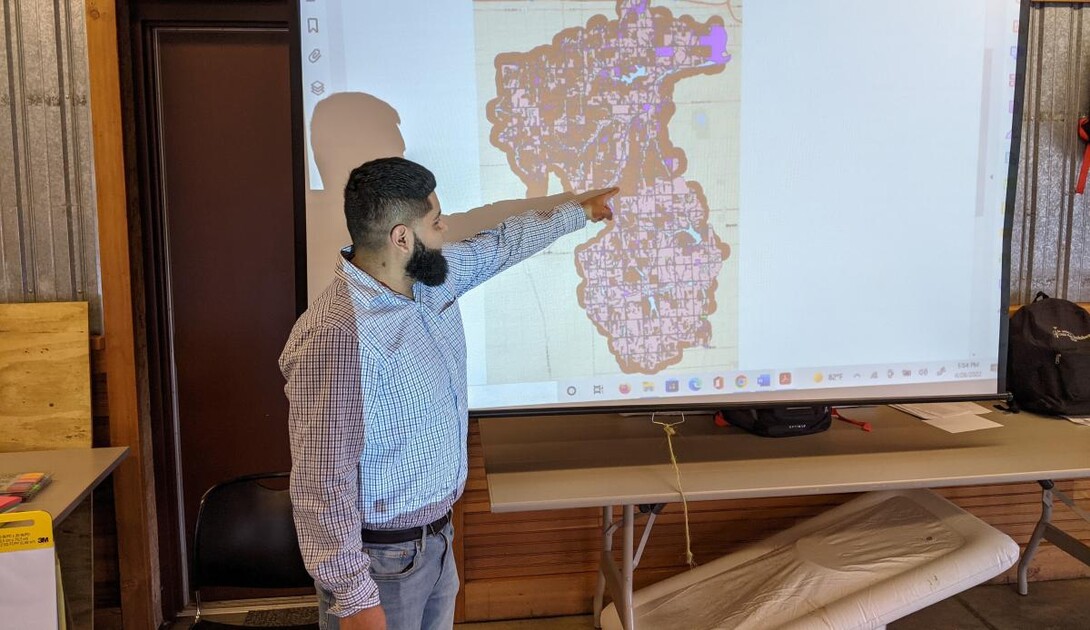
Lincoln, Neb. —Daniel Morales, an NRT master’s student studying natural resources management, led workshops in the Denton Hills on February 4 and April 28 to hear landowner concerns and gain experience in community engagement.
“I’m sure in my future career, I’m going to deal with stakeholders in managing landscapes, so getting that experience now is definitely very important,” he said.
The 17 landowners participating at the Spring Creek Prairie Audubon Center in the Denton Hills southwest of Lincoln identified woody encroachment as a top concern for the area.
Morales said red cedars, honey locust trees and autumn olive shrubs are the types of plants they are concerned about spreading into the grasslands.
“What the woody encroachment does is it really degrades a lot of the prairies, and most of these prairies offer more resources than woody species for specific birds,” he said.
Other animals such as deer and insects also depend on prairie habitats, he said.
In the eastern part of Nebraska, largely unfragmented grasslands like the Denton Hills are rarer than they are in western Nebraska. Morales said landowners in the Denton Hills recognize their landscape as unique and want to have a voice in the future of it.
Besides concerns about woody encroachment, they also expressed concerns about a loss of community connection.
“Due to Lincoln growing exponentially and a lot of people wanting to move to the rural areas, they kind of lost that community connectivity,” Morales said. “Back in the day they used to know their neighbors, but now with more people moving in, they have lost some of that.”
Morales said the workshops attracted mostly retired persons and farmers since they were held on weekdays from 10 a.m. to 2 p.m. Meghan Sittler, the director of the Spring Creek Prairie Audubon Center, had identified landowners who might be interested in attending the workshops through prior connections at the center or its activities, like prescribed burns.
At the first workshop, Morales led an exercise in which the landowners discussed their top concerns and then individually ranked them.
For the second workshop, he, his advisor, Craig Allen, and Kristal Stoner, the executive director of Audubon Nebraska, compiled the results of the participant rankings and developed scenarios for what the Denton Hills might look like down the road depending upon current choices. The first scenario involved grassland turning to woodland, the second involved a decline in water quantity and quality, the third involved urban sprawl from Lincoln, and the fourth involved industrial developments in the Denton Hills.
Morales said the biggest outcome of these workshops was they brought landowners together and increased communication among them.
“My project was the just the beginning for landowners and Spring Creek Prairie to build a stronger relationship and head towards collaborative management for concerns such as woody encroachment,” he said.
Morales said Spring Creek Prairie Center could host more landowner workshops and he was glad to have the experience of leading the first two.
“I really enjoyed hearing some of the landowners’ stories, building that connection with them and allowing them the opportunity to express themselves,” he said. “You hear them out, and you want to do something. By just providing multiple scenario storylines, you’re helping them understand what are possible futures.”
For his own future, Morales hopes to do management work in a governmental agency, like perhaps managing a U.S. Fish and Wildlife Services refuge. He worked for a refuge prior to coming to the NRT, had the opportunity to attend stakeholder meetings with the refuge manager and developed a strong interest in pursuing this type of work.
“There are certain areas, I'm sure, in the U.S. where land has just been mismanaged,” he said. “A lot of that has to do with lacking clear communication or engagement with other stakeholders. And so, I really want to work on this to make a difference--really serve that community, talk with it, and then proceed to the next critical steps of engagement.”







